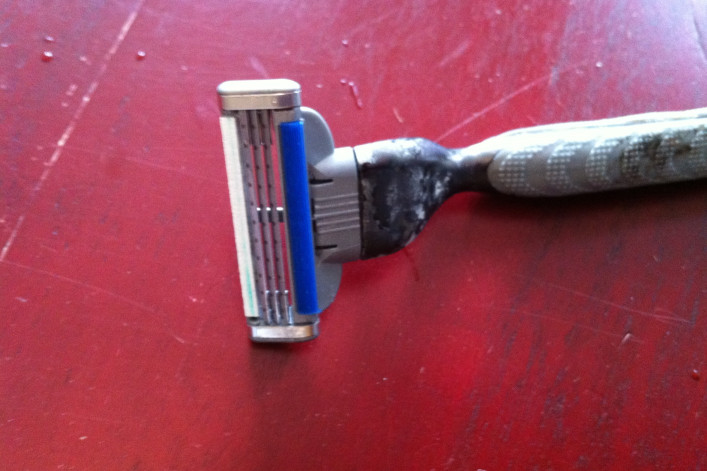Dear Sellers: Please take your used razor with you

When I first met the sellers of my new apartment at closing, they came across as a polished, well-put together couple. Unfortunately, that illusion of refinement was shattered well before I was forced to trash my fourth sponge during an epic three-hour cleaning of the range I inherited from them.
How was it, I thought, that such a seemingly well-adjusted and affluent couple would never even have bothered to clean their $4,000 oven?
The longer I tried to scrub clean that greasy, scorched hunk of high-end metal, the more I seethed. I wasn’t interested in delving into psyche of the previous owners, but, at the moment, I had no choice—they had left their giant fingerprints all over the kitchen. Soon, I started questioning the reasoning behind the other “fingerprints” they left behind.
For example, what exactly led them to decide, “We’ll take the dish soap with us, but let’s leave the old razor and our loofah.” And why, if they bothered to clear out their refrigerator, did they leave a two-liter bottle Sprite? (Maybe they predicted I would be thirsty after all that scrubbing.)
It's true that standard contracts stipulate that the seller leave the apartment in “as is” condition and, at the time of closing, the apartment for sale should be left “broom clean” and free of “rights of possession"--in other words, your stuff.
Though I had a right to contest any condition not in line before closing during the final walk-through, I only glanced at the kitchen and its oven, naively assuming that owners of such a nice kitchen would naturally take proper care of it. Lesson learned: Next time, be sure to negotiate in the contract that the seller hire a cleaning service or (if you’re not a neat freak like me who sometimes enjoys cleaning) hire one yourself before you move in.
Still, all that time cleaning did give me a chance to contemplate what leftover items would be welcome or unwelcome in a new home. Here’s the deal:
Feel free to leave:
- Liquid soaps.
- Rolls of toilet paper and/or paper towels, and common household cleaners.
- Extra trash bags.
- Packaged, unused sponges.
- Replacement parts for appliances.
- Replacement tiles for the bathroom and kitchen in case of repairs (the last two are best left in common storage and not the apartment itself).
- Manuals for apartment appliances.
- Neighborhood take out menus.
- A bottle of champagne chilling in the fridge. Very classy.
Please do NOT leave:
- Any food, canned, boxed or otherwise. If you didn't want to eat it while you were here, I don't want to eat it after you're gone.
- Used bars of soap or any toiletries.
- Your old broom. (These are frequently left behind, but they’re often old, over-used and hardly in a condition to do a good job sweeping anymore.
- Old paint cans and supplies, unless your walls are in great shape, in which case a small can of paint as a touch up is thoughtful. Otherwise, your old paint is not only unnecessary but a hassle to dispose of.
- Cardboard boxes.
- Plastic sheeting.
- Used sponges.
- Household plants. (If you didn’t want to take it with you, what makes you think I want to keep it?)
- Wire hangers.
- Furniture levelors (just because most of us live with uneven floors, doesn’t mean that we want to be reminded of that fact before moving in).
- Used hair catchers for the drain.
- Medical supplies such as band-aids, Hydrogen Peroxide, and cotton balls. (Really, anything left behind in a bathroom besides toilet paper can come across as creepy, including your old shower curtain.)
That's my list. How about yours? Any gripes about creepy things left by previous tenants? Are there any extra touches you make sure to do before moving out, or anything you'd like to see when moving in?























